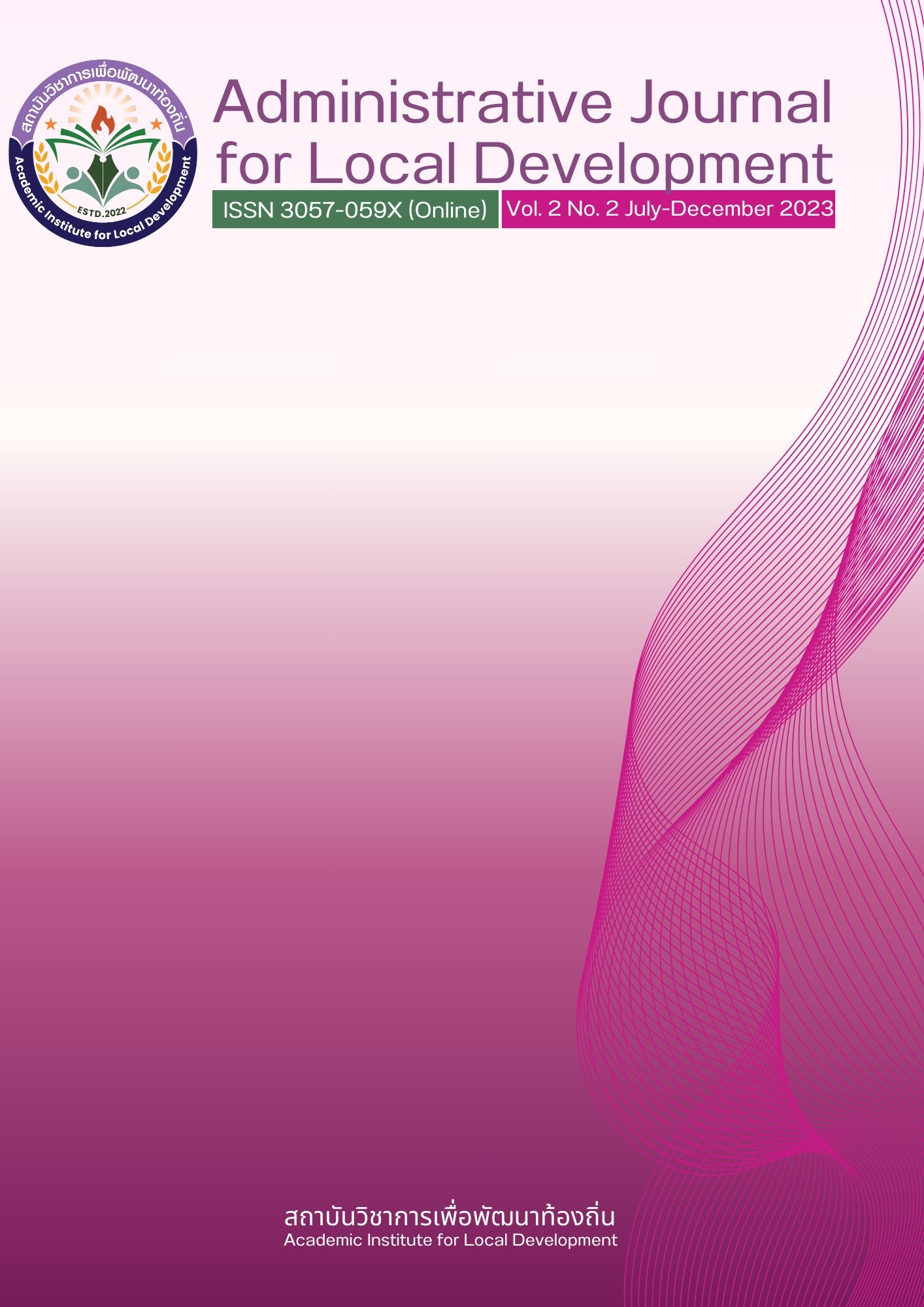Developing academic achievement in the social studies, religion, and culture subject group through the teaching and learning process using the learner-centered CIPPA model (CIPPA MODEL) on the topic of geography in Thailand. Grade 5, Ban Thung Ko School
DOI:
https://doi.org/10.14456/ajfld.2023.7Keywords:
Achievement, CIPPA Model, Learning ActivitiesAbstract
The purpose of this study was to study the learning achievement results from organizing learning activities using the teaching and learning process using the learner-centered CIPPA Model (CIPPA MODEL) on the topic of geography in Thailand. Social studies, religion and culture learning group Grade 5, Ban Thung Ko School, Nong Methee Subdistrict, Tha Tum District, Surin Province By organizing learning activities using the teaching and learning process using the learner-centered CIPPA model (CIPPA MODEL). Topic characteristics in Thailand Grade 5, Ban Ban Thung Ko School The target group for the study was 11 students in Grade 5 of Ban Ban Thung Ko School. The tool used was a learning plan on topographical features in Thailand. Pre-study and post-study achievement test The basic statistics used are percentage, mean, and standard deviation. And the statistic used to test the hypothesis is t-test.
The results of the study found that
- Academic achievement after studying is significantly higher than before studying at the .05 level.
Downloads
References
กระทรวงศึกษาธิการ. (2551). หลักสูตรแกนกลางการศึกษาขั้นพื้นฐาน พุทธศักราช 2551. กรุงเทพฯ: โรงพิมพ์ชุมนุมสหกรณ์การเกษตรแห่งประเทศไทย.
กาญจนา เกียรติประวัติ. (2524). นวัตกรรมทางการศึกษา [วิทยานิพนธ์ปริญญามหาบัณฑิต ไม่ได้ตีพิมพ์]. มหาวิทยาลัยศรีนครินทรวิโรฒประสานมิตร.
ฉลวย สุ่มมาตย์. (2551). การศึกษาผลกระบวนการกลุ่มในการสอนกลุ่มสาระการเรียนรู้วิทยาศาสตร์ สำหรับนักเรียนชั้นประถมศึกษาปีที่ 3 [วิทยานิพนธ์ปริญญามหาบัณฑิต ไม่ได้ตีพิมพ์]. มหาวิทยาลัยราชภัฏนครราชสีมา.
ทิศนา แขมมณี. (2550). ศาสตร์การสอน: องค์ความรู้เพื่อการจัดการกระบวนการเรียนรู้ที่มีประสิทธิภาพ (พิมพ์ครั้งที่ 5). กรุงเทพฯ: สำนักพิมพ์แห่งจุฬาลงกรณ์มหาวิทยาลัย.
พิศิษฐ ตัณฑวณิช. (2559). การวิจัยและพัฒนาการเรียนรู้ [วิทยานิพนธ์ปริญญามหาบัณฑิต ไม่ได้ตีพิมพ์] มหาวิทยาลัยราชภัฏสุรินทร์.
วราภรณ์ แตงมีแสง. (2545). การจัดกิจกรรมการเรียนการสอนที่เน้นผู้เรียนเป็นสำคัญ โดยใช้โมเดลซิปปา วิชามนุษย์กับสิ่งแวดล้อม [วิทยานิพนธ์ปริญญามหาบัณฑิต ไม่ได้ตีพิมพ์]. มหาวิทยาลัยขอนแก่น.
สำนักวิชาการและมาตรฐานการศึกษา. (2548). การใช้หลักสูตรการศึกษาขั้นพื้นฐานตามทัศนะของผู้สอน. กรุงเทพฯ: โรงพิมพ์องค์การรับส่งสินค้าและพัสดุภัณฑ์ (ร.ส.พ.).
สุทธิรัตน์ เลิศจตุรวิทย์. (2544). ผลของการสอนโดยใช้รูปแบบการเรียนการสอนซิปปา เพื่อการเรียนรู้ทางประวัติศาสตร์ที่มีผลต่อการเรียนรู้ทักษะการวิเคราะห์ และเจตคติของนักเรียนชั้นประถมศึกษาปีที่ 5 [วิทยานิพนธ์ปริญญามหาบัณฑิต ไม่ได้ตีพิมพ์]. จุฬาลงกรณ์มหาวิทยาลัย.
สุวัฒน์ มุทธเมธา และสิริวรรณ ศรีพหล. (2523). การเรียนการสอนในปัจจุบัน. กรุงเทพฯ: โอเดรียนสโตร์.
อดิศร มีศิริ. (2543). การพัฒนากิจกรรมการเรียนการสอนที่เน้นผู้เรียนเป็นศูนย์กลางโดยใช้โมเดลซิปปา สำหรับรายวิชาชีววิทยา ในระดับชั้นมัธยมศึกษาปีที่ 5 [วิทยานิพนธ์ปริญญามหาบัณฑิต ไม่ได้ตีพิมพ์]. มหาวิทยาลัยขอนแก่น.
Downloads
Published
How to Cite
Issue
Section
License

This work is licensed under a Creative Commons Attribution-NonCommercial-NoDerivatives 4.0 International License.










